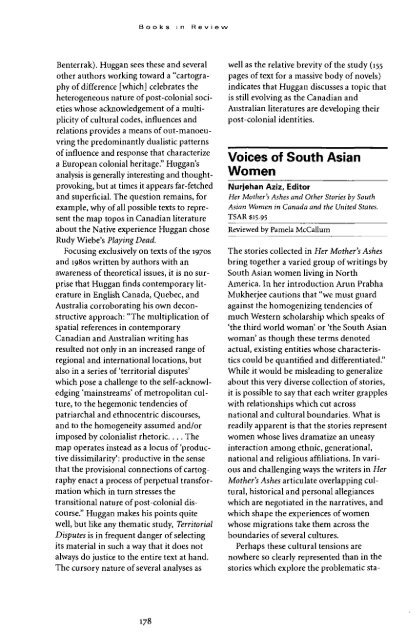Jean Rivard - University of British Columbia
Jean Rivard - University of British Columbia
Jean Rivard - University of British Columbia
Create successful ePaper yourself
Turn your PDF publications into a flip-book with our unique Google optimized e-Paper software.
Books in Review<br />
Benterrak). Hiiggan sees these and several<br />
other authors working toward a "cartography<br />
<strong>of</strong> difference [which] celebrates the<br />
heterogeneous nature <strong>of</strong> post-colonial societies<br />
whose acknowledgement <strong>of</strong> a multiplicity<br />
<strong>of</strong> cultural codes, influences and<br />
relations provides a means <strong>of</strong> out-manoeuvring<br />
the predominantly dualistic patterns<br />
<strong>of</strong> influence and response that characterize<br />
a European colonial heritage." Huggan's<br />
analysis is generally interesting and thoughtprovoking,<br />
but at times it appears far-fetched<br />
and superficial. The question remains, for<br />
example, why <strong>of</strong> all possible texts to represent<br />
the map topos in Canadian literature<br />
about the Native experience Huggan chose<br />
Rudy Wiebe's Playing Dead.<br />
Focusing exclusively on texts <strong>of</strong> the 1970s<br />
and 1980s written by authors with an<br />
awareness <strong>of</strong> theoretical issues, it is no surprise<br />
that Huggan finds contemporary literature<br />
in English Canada, Quebec, and<br />
Australia corroborating his own deconstructive<br />
approach: "The multiplication <strong>of</strong><br />
spatial references in contemporary<br />
Canadian and Australian writing has<br />
resulted not only in an increased range <strong>of</strong><br />
regional and international locations, but<br />
also in a series <strong>of</strong>'territorial disputes'<br />
which pose a challenge to the self-acknowledging<br />
'mainstreams' <strong>of</strong> metropolitan culture,<br />
to the hegemonic tendencies <strong>of</strong><br />
patriarchal and ethnocentric discourses,<br />
and to the homogeneity assumed and/or<br />
imposed by colonialist rhetoric. ... The<br />
map operates instead as a locus <strong>of</strong> 'productive<br />
dissimilarity': productive in the sense<br />
that the provisional connections <strong>of</strong> cartography<br />
enact a process <strong>of</strong> perpetual transformation<br />
which in turn stresses the<br />
transitional nature <strong>of</strong> post-colonial discourse."<br />
Huggan makes his points quite<br />
well, but like any thematic study, Territorial<br />
Disputes is in frequent danger <strong>of</strong> selecting<br />
its material in such a way that it does not<br />
always do justice to the entire text at hand.<br />
The cursory nature <strong>of</strong> several analyses as<br />
well as the relative brevity <strong>of</strong> the study (155<br />
pages <strong>of</strong> text for a massive body <strong>of</strong> novels)<br />
indicates that Huggan discusses a topic that<br />
is still evolving as the Canadian and<br />
Australian literatures are developing their<br />
post-colonial identities.<br />
Voices <strong>of</strong> South Asian<br />
Women<br />
Nurjehan Aziz, Editor<br />
Her Mother's Ashes and Other Stories by South<br />
Asian Women in Canada and the United States.<br />
TSAR $15.95<br />
Reviewed by Pamela McCallum<br />
The stories collected in Her Mother's Ashes<br />
bring together a varied group <strong>of</strong> writings by<br />
South Asian women living in North<br />
America. In her introduction Arun Prabha<br />
Mukherjee cautions that "we must guard<br />
against the homogenizing tendencies <strong>of</strong><br />
much Western scholarship which speaks <strong>of</strong><br />
'the third world woman' or 'the South Asian<br />
woman' as though these terms denoted<br />
actual, existing entities whose characteristics<br />
could be quantified and differentiated."<br />
While it would be misleading to generalize<br />
about this very diverse collection <strong>of</strong> stories,<br />
it is possible to say that each writer grapples<br />
with relationships which cut across<br />
national and cultural boundaries. What is<br />
readily apparent is that the stories represent<br />
women whose lives dramatize an uneasy<br />
interaction among ethnic, generational,<br />
national and religious affiliations. In various<br />
and challenging ways the writers in Her<br />
Mother's Ashes articulate overlapping cultural,<br />
historical and personal allegiances<br />
which are negotiated in the narratives, and<br />
which shape the experiences <strong>of</strong> women<br />
whose migrations take them across the<br />
boundaries <strong>of</strong> several cultures.<br />
Perhaps these cultural tensions are<br />
nowhere so clearly represented than in the<br />
stories which explore the problematic sta-<br />
178

















